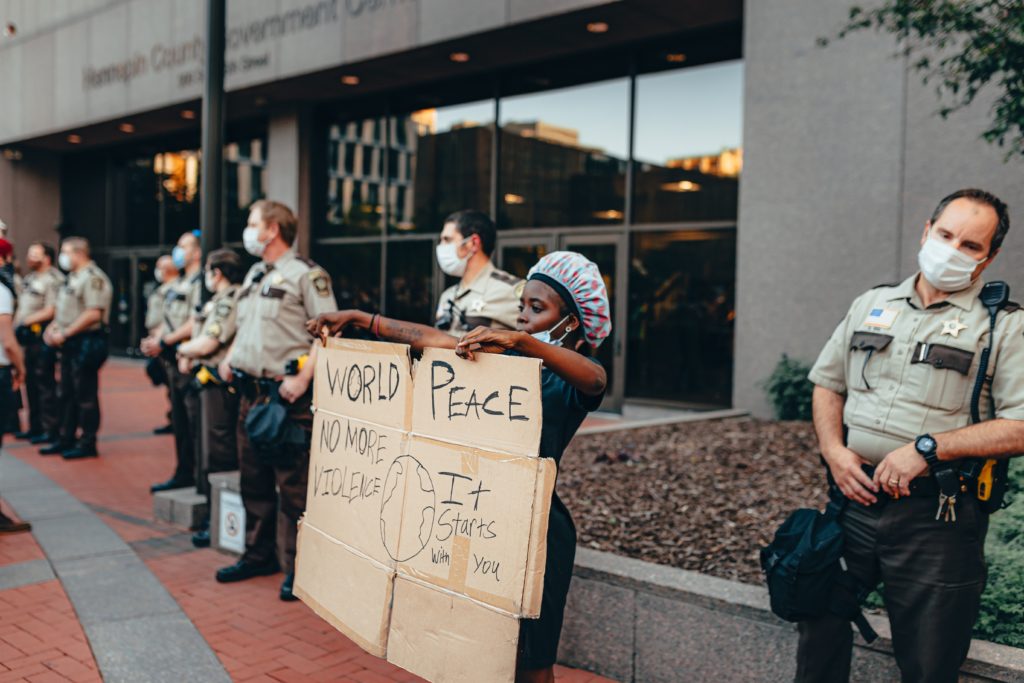
Category Archives: USA


Margaret Somers on the US-Elections
US Elections 2020
"A democratic Ritual against the underlying reality of an incompatibility between capitalism and democracy"
In an interview conducted by David Bond and John Hultgren, Margaret Somers talks about the US election, the relationship between the neoliberalism and the hypernationalism of the American Right and to which extent the liberal embrace of a “free-market” logic has contributed to the predicament in which the US currently finds itself.
3rd November, 2020

Note: The Interview was coonducted on October 28.
David Bond & John Hultgren: Maybe we could start with this: So, we’re a week out from this election. Biden is climbing in the polls and is potentially bringing new states into play. At the same time, the Supreme Court is issuing really frightening rulings about their jurisdiction over contested elections. One week out, are you pessimistic or optimistic?
Margaret Somers: I’m especially struck by the wide gap between the surface of the election drama— the polls, the policy positions, race relations–and the election’s structural underpinnings, or background conditions. While they may not completely determine the outcomes, they certainly delimit the spectrum of possibility, yet they are of course never discussed openly. The most important of these background conditions comes to us from Polanyi: We’re performing a democratic ritual against the underlying reality of a basic incompatibility between capitalism and democracy. And at some point—under certain conditions, but not inevitably—that incompatibility may well be resolved by a capitalist accommodation with fascism. That possibility is heightened by the fact that we’re performing this post-democratic ritual in the context of the most hypercapitalist oligarchic regime in recent American history, which has already moved far along the continuum to an autocracy. We’re not there yet, but we’re on the spectrum.
But my day-to-day focus is on the polls. I have doubts about how optimistic Democrats are about Biden being ahead in the polls by a wider margin than Hillary was in 2016. For while good polling constructs models and algorithms that include contingencies and assumptions, their assumptions are based on historical experience. So for example, they have decades of data that show what difference it makes if it’s raining on election day, or the effect of the so-called “shy Trump voter,” or the peculiarities of the electoral college, or the impact of the current level of unemployment, etc.
“We’re performing a democratic ritual against the underlying reality of a basic incompatibility between capitalism and democracy. And at some point—under certain conditions, but not inevitably—that incompatibility may well be resolved by a capitalist accommodation with fascism.”
What I’m worried about is that this year the degree of voter suppression is not continuous with history, because it is unprecedented in the post-Jim Crow era. So statisticians do not know how to factor in the difference between voters (especially African American and young people) who report to pollsters that they *intend* to vote for Joe Biden, but then they are prevented from *actually* voting for Biden—either through having their ballots thrown out, or discovering their name has been purged from the voting register, or being told they’re at the wrong voting place, and the multiple other ways that Democratic votes will not be counted based on Republican methods of supressing the vote. Moreover, it’s the first election in over 30 years in which so-called “poll watching” is no longer prohibited, which is code for the presence of armed white intimidation of Black voters. In almost every state in the U.S., it’s legal to bring firearms into the voting booth; we don’t know what the effect of this will be but it cannot be good. Finally, we’ve never had a President who is so clearly committed to inciting extra-paramilitary violence as well as legal violence (calling out the Insurrection Act on protestors).
Nate Silver [the premier American polling analyst and statistician] has written that the mainstream media was understating the potential effect of voter suppression. He acknowledged that while throughout American history there has always been voter suppression and voter disenfranchisement, the voter suppression strategies this year are so new that they aren’t able to use their historical assumptions to build them into the model: “[T]here are some possibilities that our model doesn’t account for, and they have become more pertinent after Trump has repeatedly refused to commit to a peaceful transfer of power and declined to commit to respecting the election results… The model also does not account for the possibility of extraconstitutional shenanigans by Trump or by anyone else, such as trying to prevent mail ballots from being counted….”
Finally, we have to add that we’ve not ever held an election in the middle of a pandemic that is escalating daily.
David Bond & John Hultgren: It’s beyond the typical forms of voter suppression, we also have the hijacking of the post office and…
Margaret Somers: Exactly… we just found out last night that Detroit—a city comprised almost entirely of Black voters—has been subjected to the most delayed mail in the country—in other words, their mailed absentee ballots are unlikely to arrive in time to be counted. In fact, almost every large Democratic city in every swing state has had their mail delayed by this Trump crony Postmaster.
…I can’t help but be very pessimistic. But I also can’t quite accept what I think is likely to happen. For example, many of us have been trying to figure out the puzzle of Trump’s campaign. All the pundits keep saying, “it’s almost like Trump’s trying to lose…all he does is feed red meat to the base. Why would he do that? Why wouldn’t he try to expand his electoral base?” But Timothy Snyder has an answer. He writes that in the “authoritarian playbook” it’s more important to incite the affective angry emotional level of your base supporters than it is to getting a thinner, wider but less fanatic base. And as we know, Trump has already acknowledged that he’s not going to win the election by getting the most votes, *but* he has announced that he’s not going to lose. How to resolve this contradiction?
The reason he hasn’t been trying to extend his voting base is because he believes that more important than the number of votes he gets is the degree of rage and the commitment he has from his base supporters to have him win the presidency. He is treating the election like a planned coup, so his priority is to fortify the emotional valence of those who will be willing to do anything to keep him in power. Above all, that is going to entail massive violence.
“He is treating the election like a planned coup, so his priority is to fortify the emotional valence of those who will be willing to do anything to keep him in power”
Perhaps even more frightening is that this tells us something about the deeply fragile nature of the popular commitment to democracy–that so many of his supporters will vote for him in the context described above where he has outlined his planned coup indicates that they are participating knowingly in a scenario that will potentially end democracy as we know it. Thus Timothy Snyder… “It’s a vote for a future in which voting does not matter…a vote for Trump is to traduce the meaning of voting, which is a normal part of the transition to authoritarianism…”
John Hultgren: So stepping back from the election for a moment to think about how we got to this point… Your recent work has focused on explaining and critiquing the idea of market justice. Does market justice persist within an American Right increasingly defined by the ideological oddity that is Trumpism? To put it differently, how do you make sense of the relationship between the neoliberalism and the hypernationalism of the American Right?
Margaret Somers: Market justice, just like meritocracy, maintains its credibility by its claim to being nonpolitical, free of power, reflecting the pure neutralism of market rewards equaling the exact amount that was inputted in contributions—i.e. unequal wages simply reflect unequal work effort and lesser market value. That’s the theory of marginal productivity. The hatred for democracy stems from it being seen as a political force that disrupts and violates the neutrality of the supposedly nonpolitical unbiased processes of market justice. It “politicizes” the market in the interest of “special interests,” and so threatens market justice. (This is also the logic of hatred for affirmative action and for the conservative racism of “color-blindness”—it pretends to neutrality while it exercises the power of exclusion.)
Market justice tells us that what the market spits out is by definition completely fair: The value that goes into the market is exactly what you get in return. The instrument that translates the theory of naturalized market justice into a social practice is the ascribing of “moral unworthiness” to those who lose out on market outcomes. There is a precise parallel between market justice and the dominating coercions of the alt-right. For the most energized enforcers of what I call the “tribunal of moral worth” are white supremacists…they define nonwhite people as “undeserving” and “unworthy” in equally naturalistic and biologized terms as that of market justice.
If you look at my Guardian piece on how Malthus uses market naturalism to justify cruelty and exclusion, you can easily transpose what he applied to the “poor” onto race. In Malthusian terms, “Nature” decides who is economically worthy and not worthy. For white supremacists, Nature is translated into race in biological terms. So, it parallels exactly marginal productivity theory which says – the famous quote – that “the distribution of income in society is controlled by a natural law, and this law if it works without friction would give to every agent of production the amount of wealth that that agent creates.” This readily converts into a tribunal of racial worth and unworth, in which social value is determined by ascribed—natural—racial identities .
But the alt-right takes it one step further: It’s not merely that non-white people don’t contribute enough to be worthy of inclusion; they are also supposedly stealing from the worthy (white) people. They (unworthy and undeserving non-whites) are undeserving social parasites who are taking away white males’ naturally privileged place in the social hierarchy. The alt-right’s hatred toward liberals is driven by their belief that liberals are facilitating this theft by the unworthy, which in turn generates a culture of enraged aggrievement of the entitled convinced they have been wronged. This is why they love Trump for his casual cruelty…Trump is saying for them what they felt they weren’t allowed to say for too long. They thrill at his sadistic transgressions of “political correctness,” especially against women and people of color.
For plutocrats, the currency of worth and unworthiness is defined by marginal productivity; for white supremacists, the currency is race. It’s very convenient that these two systems of evaluation converge on the same people: Immigrants, women, and people of color.
David Bond: From Clinton’s welfare reform to Obamacare and “cap and trade,” the Democratic Party has long toyed with its own versions of market justice (and, to a lesser extent, social naturalism). To what extent has the liberal embrace of a “free-market” logic contributed to the predicament in which we currently find ourselves? Do you see signs that Biden/Harris are willing to shift to something resembling a social democratic taming of the market?
Margaret Somers: Let’s start with the most damning evidence that confirms how the Democrats participate in the policing of market justice and accept the social naturalism on which it’s based. Consider that the most dramatic rollback of the social state in 40 years of neoliberalism took place under Bill Clinton, the so-called 1996 Welfare Reform Bill, which was orchestrated entirely through Malthusian discourse of both social naturalism and the perversity thesis: Namely, that relief of poverty to the poor has the perverse consequence of disincentivizing them to work. Why? Because of the foundational biologization of working people, which reduces them to their bodily instincts of “thinking through the body”—Work when hungry; hibernate when full. In this biologized naturalistic world, removing scarcity by providing social provisioning to the needy is what causes poverty in the first place; it frees workers from taking personal responsibility by removing the scourge of hunger.
In Piketty’s new book, Capital and Ideology, he documents extensively the degree to which the social democratic embrace of neoliberalism, especially their embrace of austerity, in Europe and the U.S. contributed enormously to the extreme increase in inequality. Their unwavering commitment to globalization led to today’s alliance of what he calls hypercapitalism with ethnonativism—a term that captures those who were left behind by neoliberal policies who have now turned to right-wing populism.
Lest anyone think I’m exaggerating when I say that the Democrats (and Labour) believe in market justice and social naturalism, consider Clinton’s view of globalization: “[It is] the economic equivalent of a force of nature, like wind or water.” As Tony Blair declared defending his policies in the globalization debate: “You might as well debate whether autumn should follow summer.”
Now, to be fair, let’s stand back a minute and take a Polanyian look at the situation and we see that these were not merely perverse choices of wannabe Conservatives—these were/are social democrats trying to navigate the shoals of the basic incompatibility of capitalism and democracy, and face resistance to the “intrusion” of the democratic populace into the supposedly private sphere of the economy. Polanyi reminds us that when faced with a choice between supporting democratic socio-economic reform on the one side, and authoritarian protection of capital on the other, economic elites and global capital have almost always chosen the latter. As he reflected on the collapse of civilization in the 1930s: “[T]he victory of fascism was made practically unavoidable by the [market utopians’] obstruction of any reform involving planning, regulation, or control” (Polanyi 2001, 265). It couldn’t be more clear: Protecting capital against democracy is the historical norm.
Polanyi’s analysis helps explain why the American Republican Party, as the primary carrier of neoliberalism, so determinedly protects, enables, and advances Trump’s authoritarianism. The more that Democrats move in a progressive direction with social democratic goals at the top of their platform, the more we witness the Republicans’ embrace of Trump’s strong state, weak democracy project—authoritarianism, in short.
As for Biden and Harris…how far they can go in the direction of socioeconomic reform will depend on how far capital will let them go before threatening to pick up their marbles and go elsewhere in capital flight. They will also be impeded by the rage that Trump (even if no longer in office) will continue to foment among his supporters with his faux populist discourse. Above all, they will have to contend with the American institutional structure of de-democratization –the severely undemocratic Senate, the multiple veto points to suppress the “mobocracy,” the antidemocratic Electoral College, and the reigning juristocracy, which at this point is the most dangerous of all. In America, it is the judiciary that has the last word on how successful the plutocracy will continue to be, and lest we forget, the judiciary has been seized by the extreme right for generations to come.
John Hultgren: You end with a warning, echoing both Polanyi and Luxemburg, that the future will be one of either democratic socialism or fascism. Which path do you think we’re heading down? From a Polanyian perspective, do you see cause for optimism?
Margaret Somers: At the macroeconomic level we are faced with the same conflict between capitalism and democracy. Polanyi explained 1930s Europe as both the apogee of their incompatibility and the nadir of the consequences: Capital’s commitment to the global Gold Standard crushed national democratic efforts to enact social reforms to protect against the extreme privations of market inequality and mass unemployment from the Depression. To ensure the forces of democracy were thoroughly tamed, global economic liberals turned to authoritarianism and fascism to achieve their ends. As Steve Klein (2019) has recently reminded us, Polanyi understood that the initial “antidemocratic virus” (Polanyi’s words) made it all too easy for capital to find succor with a movement committed to “a structure of society which would eliminate the very possibility of its reversion to Democracy.” That should haunt us today.
At the same time, Polanyi made clear that fascism was a contingency, not an inevitability. He lays out what is necessary for democratic forces to subordinate the deceits of market justice to an egalitarian and just society built on individual and social rights and freedoms. These are the necessary steps to achieve democratic socialism, which Polanyi defines as “transcend[ing] the self-regulating market by consciously subordinating it to a democratic society.” They include first and foremost, the decommodification of humans, of nature, and of money, which entails taking out of the market the fictitious commodity of “labor.” Some of this can be facilitated by fighting for newly constitutionalized socio-economic rights, and some even by redistributive policies of the social state. But above all it requires tearing open the hidden world of predistributive market power. (Incidentally, in the context of the American failure to contain Covid19, it would require, as Fred [Block] and I recently wrote on Polanyi and Covid19, decommodifying the necessities of the democratic public good of public health.) Following Polanyi again, much of this is going to depend on the strength of the progressive left, and on the willingness of Democrats to make alliances with the left. That will demand that Democrats be willing to fight for power and democracy as a substantive goal.
In closing, as I wrote at end of my article on the “Moral Economy of the Capitalist Crowd”:
“Because Polanyi’s was as much a normative project for a just moral economy as it was historical analysis, his alerting us to the seductive dangers of [market] utopianism is as relevant today as it was in the 1930s…[It] is a precondition to fashioning a democratic rather than an authoritarian response to the cruelties of market utopianism.”

Margaret Somers
Professor Emerita of Sociology and History, University of Michigan, Ann Arbor. Political Economy, Social Theory, Comparative Historical Sociology
David Bond
Associate Director of CAPA (Center for the Advancement of Public Action) in Bennington College, Vermont, USA
John Hultgren
Faculty of Society, Culture & Thought and Faculty of Environmental Studies, Bennington College Vermont, USA
More on the US:
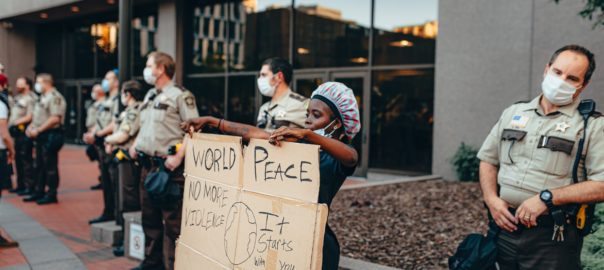
Degrowth and the US-Elections

US Elections 2020
"Our most fundamental need is for a habitable planet - and we’ve lost sight of it"
In order to better understand the current fight for the presidency in the US, John Hultgren and David Bond from Bennington College (Vermont, USA) talked to Gareth Dale about the importance of the Green New Deal, the need for a reduction of fossil fuels and the Degrowth movement.
29th October, 2020
The Green New Deal and the Threat of Corporate Capture
David Bond & John Hultgren: The Green New Deal has captured the imagination of the Left in the US and beyond. After decades of playing defense, the Green New Deal advances a bold progressive vision on par with the immense need of today: a moment tipping precariously towards climate catastrophe. The Green New Deal also has the great advantage of harkening back to an immensely popular moment when government reimagined its responsibilities to the people. Drawing on Karl Polanyi’s own “ambivalences and ambiguities” about the New Deal, you advise caution on the Green New Deal. Can you explain your hesitations around the Green New Deal?
Gareth Dale: As you say, the climate catastrophe is tipping perilously. The Mauna Loa emissions graph climbs ever upwards. Radical change is urgent, and the GND is visionary. We shouldn’t see it as a definitive programme but as a “battlefield”—to use Thea Riofrancos’ term. And so too was Roosevelt’s New Deal. He didn’t enter office with a social-democratic agenda. It came thanks to movements—the hunger marches and rent strikes, the Teamster Rebellion and the waves of sit-down strikes. Those same years remind us that when organisers and movement leaders tied themselves to state institutions, their ability to mobilise went into decline. And while the New Deal did enact vital progressive reforms, and legitimated the unions, it also re-stabilised the capitalist order. It consolidated America’s grotesque, nature-trashing growth model—and then Roosevelt launched the US oil grab in the Middle East. Similar dangers face the GND today. State leaders and corporate interests are trying to own it. We saw this back in 2008 with the so-called green stimulus packages in South Korea and China. When you looked at the detail there’s virtually nothing green, it’s almost entirely greenwash and growth boosterism. The same was seen again in South Korea this year with its new GND. Within a fortnight of the announcement, the Korean government authorised a colossal bailout of Doosan Heavy Industries, one of the world’s biggest coal exporters. So any “caution” I’m voicing is against the threat of corporate capture. The movement angle of the GND, the campaigning efforts and visions of environmentalists and socialists, is inspiring—a bright light in the general murk.
“When organisers and movement leaders tied themselves to state institutions, their ability to mobilise went into decline”
David Bond & John Hultgren: Despite being quite popular and fanning the enthusiasm of the progressive wing of the Democratic Party, in the current presidential campaign the Green New Deal is lambasted by both sides. Trump calls it a socialist takeover of American democracy while Biden backpedals into a less transformational, more corporate friendly, and utterly devoid of social justice version he calls “Build Back Better.” With so much at stake in 2020, why do you think now is the time to push the Green New Deal to clarify its relation to growth in particular and to the capitalist state in general?
Gareth Dale: Surely it’s always the time to clarify the relations of political projects to capital and capitalist states, for it’s they who set the economic and political framework, the rules. It’s their machine that’s steering the world to the precipice. Trump’s version is the death cult, exulting in planetary arson. Biden is a bit less repulsive, but driving a similar juggernaut. He’s currently distancing himself from the GND but if he returns, it’ll be with the aim of clipping its wings, taming it for Wall Street. So yes, in November 2020 there’s a lot at stake—and this campaign year also showcased the ability of the US electoral system to blackmail the left, with the threats that any militancy will endanger the Democrats’ prospects. So, whoever wins, organising in our communities and on the streets (…um, with masks of course…) will be more needed than ever: to push back the fascists, to keep the heat on Biden (if he wins), but also to begin to build left spaces independent from the state-supporting parties.
Fossil Fuel Reduction, Poverty Reduction & Degrowth
David Bond & John Hultgren: COVID-19 has shuttered economies around the globe and sent hundreds of millions of people worldwide into abject forms of destitution. As transportation ground to a halt and people sheltered in place, fossil fuel consumption declined significantly. You note that the sharp reductions in CO2 emissions we’ve experienced in the past 9 months must continue for decades to stave off the worst of climate change and retain some semblance of modern society. How can we continue drastic reductions of fossil fuels without also sending billions of people into poverty?
Gareth Dale: Well, billions of people already are in poverty. If we don’t drastically reduce fossil fuel use, they’ll be sent into early graves—and perhaps the human species with them—through the well-established laws of global heating and the slightly less predictable feedback loops that it’s triggering. As to how to reduce, the climate threat is so severe that drastic reductions are needed of both fossil fuel production and overall demand. So, ramp up renewables, quickly. And cut demand. Human energy consumption rose from forty terrajoules per year in 1900 to a hundred in 1950 to over five hundred today. That’s unsustainable, and can’t all be supplied by wind and waves. Obvious targets are the consumption of the super-rich, and the Pentagon—slash all that. Direct resources instead to supporting the poor, ensuring good food and shelter, and water, sanitation and electricity for all. And beyond? Well, homo sapiens is an enthrallingly needs-expanding species, but are we also a needs-comprehending species? Our most fundamental need is for a habitable planet and we’ve lost sight of it—thanks to the blinkers enforced by the capitalist system. Really, humanity should hunker down for a few hundred years. Tread lightly, to save ourselves and millions of species. This isn’t a prescription for hair shirts and self-flagellation, but resource and energy use must be clipped. You and I met at a Karl Polanyi conference. Well, in the early twentieth century Polanyi lived a happy and culturally extremely rich life, consuming a small fraction of the energy and materials that are at the command of his counterparts today. And Marx and Engels in the Communist Manifesto argued that the productive forces had reached the point at which a transition to communism could be envisaged. This was 1848. Before the invention of the car, the telephone, even the safety pin. I’m not suggesting we ‘rewind’ to that date. But for the love of life, of people and nature, present and future, a few delights of civilisation simply have to be suspended: all SUVs, all aviation (apart from dirigibles), nearly all beef (unless lab-grown), and so on.
“Our most fundamental need is for a habitable planet and we’ve lost sight of it—thanks to the blinkers enforced by the capitalist system.”
David Bond & John Hultgren: Degrowth, you have argued, is actually the most sober assessment of the current situation. Yet it struggles, as you note, to “find mass resonance.” Part of the New Deal, you suggest, contained kernels of contemporary degrowth – the government suppressed housing construction, people tore up their lawns and grew victory gardens, etc. Yet outside of the inflamed patriotism of a nation at war, it’s hard to imagine such sacrifice becoming a core commitment of party platforms let alone policies in the US. How can degrowth gain an enthusiastic base? Can we have a “homefront ecology” shorn of its nationalism?
Gareth Dale: A ’sober’ assessment of our situation is hard to reach. Can human minds really grasp the import of the climate catastrophe, the accelerating mass extinctions that their society is causing, let alone the possible end of their species itself? But yes, the degrowthers come closer than anyone else. In terms of strategy, I would put a rather different emphasis: I’d emphasise climate jobs programmes. These bring labour unionists together with environmentalists to campaign for a state-led ‘just transition,’ with secure ‘green jobs’ and care jobs and across-the-board economic change. It’s a programme that can address, and counter, two great fears of the present—mass unemployment and environmental collapse.
David Bond & John Hultgren: The poor have, in one way or another, been living a coercive form of degrowth for generations. Is there a class dimension to your theory of degrowth?
Gareth Dale: Degrowthers would say you’re completely misrepresenting their position. Their politics is all about overcoming poverty even as the materials and energy envelope reduces. And in some of my own work (The tide is rising, don’t rock the boat!), I’ve discussed how the growth paradigm, as an ideology of capitalist society, has been used historically to legitimate poverty and inequality. So yes, all of this pivots on class. The capitalist system is geared to relentless accumulation, which is spun as “growth,” which destroys nature, polarises society by class, by race, by gender and between rich and poor nations. The ownership of the world by a particular class—capitalists—who are driven by competition and the profit motive—is the root of all these evils.
“The capitalist system is geared to relentless accumulation, which is spun as “growth” and destroys nature, polarises society by class, by race, by gender and between rich and poor nations.”
David Bond & John Hultgren: The last decade has brought tremendous hope for progressive policies in the US as the neoliberal agenda is shown to be insufficient to the present challenges and actually part of the problem. In many parts of the world, the perennial logic of austerity is weakening and tax hikes on the obscenely wealthy promise a new boon to an emboldened progressive state (in the US, nationalized healthcare, free college education, and the Green New Deal). Is there a danger, in such a conjuncture, that a turn to degrowth morphs into an argument for austerity by progressive means?
Gareth Dale: Degrowthers are totally opposed to neoliberal austerity politics. A few of them do re-work the term ‘austerity’, but for very different purposes. On this, I criticise their position, you can find it in Degrowth and the Green New Deal. But it’s a small difference, perhaps only a quibble. And I hope you’re right about the tax hikes on the super-rich!
Polanyi's non-revolutionary Socialism
David Bond & John Hultgren: You argue that Polanyi “advanced a radical but non-revolutionary socialism.” Is there a contemporary party or movement that is similarly advocating for this brand of socialism? Where does BLM fit into this?
Gareth Dale: Yes, Polanyi was an anti-capitalist but didn’t understand capitalism—indeed, it wasn’t even on his theoretical compass. I think Bernie and especially Corbyn are quite close to his politics. That came with some tremendous strengths—not least of course the ability to build a sizeable socialist movement—but also weaknesses—including the tendency to collapse back into the liberal centre, and in Sanders’ case to cast votes for US imperialist adventures and projects. As to BLM, well, how much has it taught us, yet again this year! What an inspiring reminder of the capacity of popular rebellion to shake up an ossified political landscape. It has reminded us how radical politics can challenge the state ‘from without.’ Thanks to BLM, race politics in the US may have made greater strides during Trump’s tenure than any time since the 1960s. Possibly not. But even to have raised this as a possibility would’ve been laughed out of court half a year ago when politics still seemed a space strictly reserved for the state-supporting parties.
Gareth Dale
Gareth Dale is senior lecturer in politics and international relations at Brunel University, London. Before joining Brunel in 2005, he worked at Birkbeck, the LSE and Swansea University. His most recent books are Karl Polanyi: A Life on the Left and Reconstructing Karl Polanyi: Excavation and Critique, and a critique of ‘Green Growth’ (all in 2016).
David Bond
Associate Director of CAPA (Center for the Advancement of Public Action) in Bennington College, Vermont, USA
John Hultgren
Faculty of Society, Culture & Thought and Faculty of Environmental Studies, Bennington College Vermont, USA
More on the US:
Polanyi in the US
Polanyi all over the World
History, Once More, in the Gear of Social Change
In this fourth part of our series 'Polanyi all over the world', David Bond and John Hultgren took some time to review 'The Great Transformation at 75', probably the first major Polanyi conference held in the US in October 2019. In their essay, Bond and Hultgren elaborate on the three main issues that came up again and again during the conference: fascism, democracy and the climate - and thus draw a bigger picture of the multiple crises happening in the US today.
30th of June, 2020

David Bond and John Hultgren
In October 2019, Bennington College in Vermont, USA, organized a conference entitled “The Great Transformation at 75” to celebrate the 75th anniversary of the publication of Karl Polanyi’s magnum opus. It was the first major Karl Polanyi conference in the United States to bring together scholars from all around the world, all of whom gathered in this small town where Polanyi found intellectual sanctuary while writing The Great Transformation.
Introduction
In 1940, as recession, racism, and totalitarian rule metastasized into worldwide terror, Bennington College announced it would devote its annual lecture fund to supporting endangered scholars fleeing the rise of fascist Europe. Through the serendipitous intervention of Peter Drucker, Karl Polanyi soon arrived on campus as an honorary fellow of the college. It was here, amid the rolling hills, meandering roads, harsh winters, and warm conviviality of rural Vermont, that Polanyi found the time to pull together scattered lines of inquiry into his prescient masterpiece The Great Transformation.
To mark the occasion of the 75th anniversary of its publication, this past October Bennington College brought together scholars and journalists from around the world to reflect on how Polanyi’s magnum opus might help us to understand the worsening condition of the contemporary. The last few years have witnessed the advance of fiercely anti-democratic forces, economies shedding any figment of generalized prosperity, eruptions of parochial hatred and insurgent racisms, the forced displacement of millions, and deepening ecological instability as the uneven impacts of climate change intensify. For three days, we gathered in seminar rooms, dining halls, and walks across the campus Polanyi called home to reflect upon the discordant timeliness of The Great Transformation today. With generosity of thought, spirited debates, and a growing sense that that present is being stretched past its breaking point, we discussed how the insights of The Great Transformation might sharpen our engagements with our fractured world, both to better grasp the cascading forces that enliven human inequity today and to chart ways past them.
Surely, we are living in an age of upheaval once more. Yet our conversation turned to Polanyi’s work less as a blueprint for explaining our present turmoil than as a potent set of concepts that help clarify the specificity of our contemporary crisis. The Great Transformation, as Robert Kuttner reminded us, is not scripture. And it was in the gaps between Polanyi’s terminal diagnosis of his time and our own inhospitable condition that some of our richest conversations took shape, whether around the necessity of incorporating capitalism, as Nancy Fraser insisted, or the necessity of foregrounding ecological crisis, as James Scott retorted. Polanyi always believed society would eventually act to save itself, Michael Burawoy said at one point; today, such survival cannot be presumed. Over the course of the conference, three themes emerged that now anchor this essay: 1) the origins and geography of resurging fascism; 2) the tactics and reach of reinvigorated democratic practice; and 3) the potential form and purpose of eco-socialist responses to the climate crisis.
Fascism
The Great Transformation insists that fascism is a global phenomenon, forged in the fires of international finance and geopolitics. But it was the inability of democratic institutions to join with popular pressures against marketization that formed the soil within which each instance of fascism took root. Against a backdrop of lived subtractions and foreclosed horizons, authoritarian rule once more surges to the helm. While Bolsonaro, Erdogan, Orban, Duterte, El-Sisi, and Trump are frequently explained by provincial problems and national resignation, is there an underlying thread that ties these instances together? What wider webs of misery now snag democratic vitality and entice brutality from above? While some participants turned to the disruptive terrain of globalism and the preemptive tyranny of financial institutions as the key update to Polanyi’s theory of fascism, others brought attention to how militarized violence cleaves populations from social legibility, how progressive identarian critique has hollowed out the terrain of human values, and how climate change shifts our primary register of induced precarity from financial networks to ecological systems.
While widening the focus beyond the nation, Polanyi also insisted we not give too much credence to the fascist militants who first seized power. The Great Transformation carries that startling insight of the 1930s: fascism was not a revolutionary seizure of power but a palace coup. Wary of a socialist reckoning rising in the winds of popular dissent, German business and party leaders readily handed the keys to the statehouse over to a ragtag bunch of militants. In a calculation that still resonates, elites found the burlesque brutalities of fascism more reassuring than reinvigorated democracy. Sound familiar? Even as the corruption and savagery of the Trump Administration comes to ever more light, Trump’s fundraising continues to break records, and relatively few CEO’s have publicly criticized him, as Fred Block noted. In the US, we have to wonder if white nationalist rallies and self-appointed militias should be better understood as a dress rehearsal of what Polanyi called “the sham rebellion” of fascism rather than a broad grassroots revolt against democracy. Indeed, many commentators overlook the well-heeled coalition of evangelicals and shareholders that stand behind Trump, instead explaining our lurch into authoritarianism by way of a clown car of adolescent grievances that appears to be leading the neo-fascist parade. But who is paving the way?
Democracy
Democracy is under siege. Whether in exempting amassed money from democratic accountability, in widening the reach of executive prerogative, in criminalizing expressions of popular sovereignty, or in tactically restricting access to the ballot, the institutions and practices of democracy are battered from all sides. So much of this echoes themes in The Great Transformation, where Polanyi diagnoses an “anti-democratic virus” endemic to the industrial state. Yet across the US and Europe, capital left the factory for dead decades ago. While still coloring policy prescriptions and the conceptual iconography of class, industrialism is largely a thing of the past in so much of the US and Europe. Where, then, does the contemporary virulence of anti-democratic forces come from?
The legitimacy crisis faced by democratic states is in no small part a product of global institutions in which free-market policy prescriptions are deeply entrenched. Greta Krippner, Claus Thomasburger, and Shaina Potts reminded us that international financial institutions continue to take great pains to insulate economics from politics, and both from democratic pressures. With neoliberal reforms constitutionally enshrined in the World Trade Organization, International Monetary Fund, and myriad free trade agreements, what recourse do democratic publics have to resisting the tired triumvirate of austerity, privatization, and deregulation? While radical cosmopolitan sensibilities increasingly permeate left movements, the institutional venues for demanding socialist (or even social democratic) reforms at a global scale remain altogether absent. Robert Kuttner asked: Can democracy survive global capitalism?
The fallout from decades of neoliberalization is acutely felt at home, where shuttered storefronts line Main Street, where work is shattered into pieces (none adequate to build a life), where dreams of ownership are cast aside as rents rise, and where the toxic aftermath of industrial pasts darkens and dampens collective aspiration. Distrust in the system is at an all-time high, and anger refuses the compromised ideologies and platforms of party politics. In these conditions, forms of what Sheldon Wolin calls “fugitive democracy” remain; for example, in the activism of care workers examined by Brigitte Aulenbacher and the solidarity economy movement highlighted by Marguerite Mendell. And yet, much of this democratic ferment unfolds in places of some privilege, at scales below the state and outside the corridors of accumulation. Perhaps we need to re-center democracy around distribution, as Margaret Somers suggested, to confront the profitable basis of our disorder more directly. Or perhaps local struggles over habitation, as Fred Block described, can provide a new basis of progressive politics beyond archaic institutions unable to reign in circuits of capital. From the reallocations of goods or the possibilities of care, our discussion explored the pathways that might pull the capacities of the state into a more principled taming of the market. Whether these political stirrings prefigure new Red Vienna’s or represent the ghost dance of a dying demos, our discussions of democracy were inseparable from considerations of socialism.
Climate
For one weekend in Vermont, the necessity of a radical socialist transformation was the default political position in regards to climate change. In true Polanyian fashion, this was not a promethean socialism, where economic growth and technological progress co-exist as hallowed solutions to distributional struggles; but, rather, an eco-socialism where the plausibility of continual economic growth in the midst of ecological crisis must be questioned. At the center of our debate lay the Green New Deal, a bold policy aimed at reasserting democratic control over the economy by bending its capacities towards the production of environmental goods and creating decent jobs in the process. For Kate Aronoff, the Green New Deal is far preferable to market-based reforms like carbon taxes or cap and trade programs whose moderate tone covers over their broken logic: adapting to the crisis of fossil capitalism by drawing nature even further into the casino economy. Gareth Dale cautioned, however, that a Green New Deal, as currently conceived, continues the conceit that we can maintain infinite economic growth on an ecologically finite planet. Referencing the near universal expectation of meat and petrol as the basis of the good life, Andreas Novy asked how a Green New Deal can be implemented in a way that doesn’t reinforce what Brand and Wissen term the “imperial mode of living”?
The lessons of the original New Deal are instructive in this regard. Many Polanyi scholars look to the post-war moment — the durable legacy of the New Deal and the social programs of the Labor Party in England – as the best example of what taming the market consists of in policy (despite Polanyi’s own disappointment about what unfolded in the US and UK after World War II). In light of our present ecological crisis, it is worth reconsidering if the broad post-war prosperity experienced in the US and western Europe was the result of democracy reining in capitalism, or of the engine of capitalism shifting from exploited (domestic) labor to extracted (foreign) nature. While labor successfully negotiated a pathway into middle class lifestyles for workers, and national institutions held back the most spectacular excesses of capital, the economies became newly attentive to, and dependent upon, a massive influx of coerced resources from abroad. The compromise of the industrial welfare state was an agreement, in no small part, bankrolled by Nature from elsewhere.
Mindful of this history, there existed widespread agreement that the Green New Deal must be internationalist in scope, tackle the problem of unequal ecological exchange, and figure out ways to confront an international institutional infrastructure in which markets remain sacrosanct.
A New Age of Upheaval
Kari Polanyi-Levitt closed the conference by walking us through the personal and historical disruptions that converged in the writing of The Great Transformation, and how prescient Polanyi’s emphasis on upheaval has proven to be. And even as we took stock of this new age of upheaval we had no idea of what lay ahead: a global pandemic that, in a matter of weeks, infected every inhabitable corner of the globe. COVID-19 appears a species level event that has catapulted the vulnerabilities and values of humanity itself to the forefront of policy considerations worldwide, though the lesson so far seems to be dismally familiar: distribute suffering downward rather than face-up to the great transformation needed to lift us all up, together.
The world’s poor will surely bear the brunt of this pandemic in the long run, but in the short-term COVID-19 has pricked the swagger of superpowers. The United States has found its sizable fiscal and militarized grasp on the world wholly inadequate to the task of taming this virus. Although it has now shelled out trillions of dollars to stabilize corporate bottom lines, by most human measures the US is a failed state. In this maelstrom – with the economic free-fall and pandemic purgatory that falls hardest on the poor and racial minorities – yet another overt act of racial violence has galvanized a widespread uprising. These past few weeks have witnessed protests that both seize upon and exceed the dilemmas of the pandemic, protests that provide an outlet for both longstanding racial injustice and newfound despair. On the one side, a newly energized movement for racial justice demands the defunding and/or abolition of police, the empowerment of local communities, and, above all, the basic right to breathe – a right threatened by the indiscriminate use of violence, environmental injustice, and inequitable access to healthcare. On the other side lies the demographic and ideological remnants of American conservatism, where the edifice of market fundamentalism is so strong that, even in the face of a pandemic, begging for the freedom to work and the right not to wear masks makes more sense than calling upon the state to provide ample monetary assistance and adequate healthcare. The resonance of this neoliberal reaction is narrow enough, though, that the Right has fallen back onto the only iron-clad ideological tenet of Trumpism: white supremacy.
Worldwide, dissent and despair now gather again on the knife’s edge between the ease of authoritarian certainty and the work of socialist transformation. It may be premature to declare that twentieth century civilization has collapsed, but there is little doubt that history, once more, is in the gear of social change.
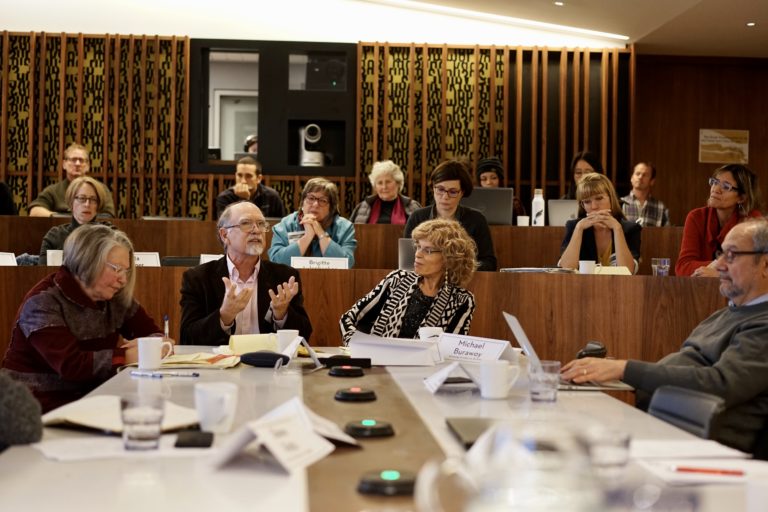
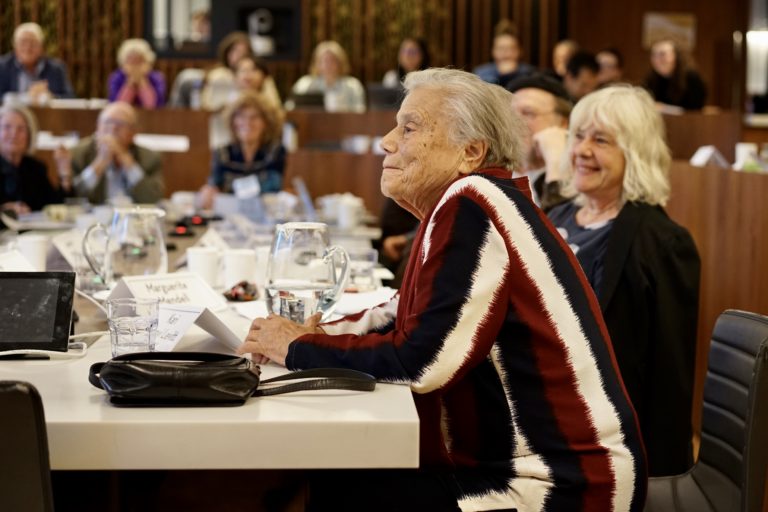
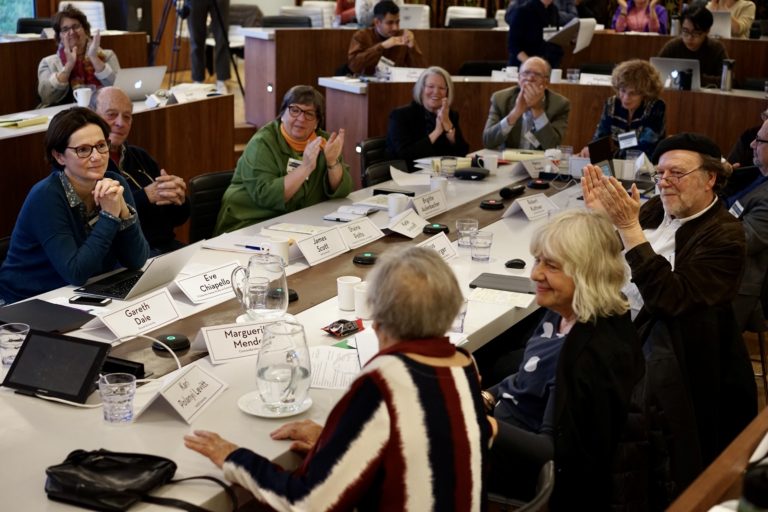
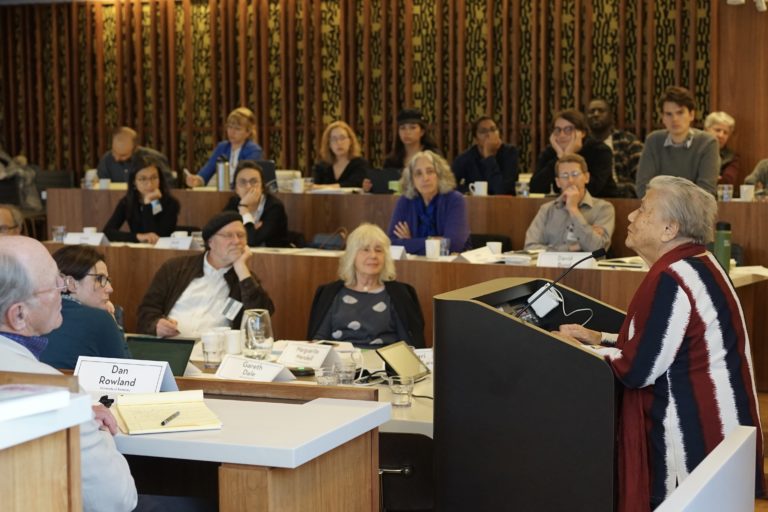
David Bond
Associate Director of CAPA
(Center for the Advancement of Public Action,
Bennington College
Vermont, USA
John Hultgren
Faculty of Society, Culture & Thought and Faculty of Environmental Studies, Bennington College
Vermont, USA
More ‘Polanyi all over the World’:


